Meet the Poets: Nathan Copeland
Nathan talks to us about performing gender, Ocean Vuong, and what's currently on his bedside table
You can read Nathan’s poem “Soy Boy”, and listen to Nathan it himself, in Issue One of the Seaford Review.
What can you tell us about this poem?
Soy Boy, for me, is in conversation with Judith Butler’s notions of gender and sexuality as performance. You know, the whole: it’s not being straight that causes one to act straight; instead, it’s all the ways you act that add up to this idea of straight or masculine or whatever label we’re talking about. The ideas of masculinity, femininity, straight, gay... It’s all an imitation of itself.
So, if it’s all simply an imitation of itself, where is its beginning? If masculinity is a copy, it’s only a copy of a copy. Where is the original? If it’s all a performance, as Butler tells us, do we not just end up with some obscure, camp adaptation of it that’s lost its roots? That’s what I really wanted to explore with Soy Boy.
We’re all human. But somehow, that’s never enough. We feel this need to slap labels on ourselves. And even more so on each other. Why is that? Who determines it? Is there a “good” version and a “bad” version? Like “good” masculinity, for example. What does that even look like? Empathetic? Understanding? Crying? Are these not just attributes to being a “good” human being?
As you can see, there’s a lot of questions - and that’s kind of the point with Soy Boy. In the end, Soy Boy is my way of wrestling with all of these juxtaposing ideas of masculinity, the performance of it, and the strange ways in which we try to define it.
What poets and poems are you in dialogue with?
Andrew McMillan and Ocean Vuong have my heart, collectively. The way they both dissect and interrogate themes of queerness, masculinity, and heritage with so much attention to detail. The way they both play with and manipulate language, making words bend to their will so effortlessly. Read Vuong’s essay on Reimagining Masculinity and you’ll know exactly what I mean. In this, he makes reference to one of my favourite poems, Old Glory, which does a delicious job of interrogating language and masculinity. The poem pops in your mouth as you read it. They’ve both probably single-handedly informed my writing the most. Some of my favourite poems include Thanksgiving 2006, Telemachus, and Notebook Fragments by Vuong, as well as Playtime and Personal Trainer by McMillan.
Do you write in other forms? How do you toggle between them?
I dabble in this and that. I love fiction that reads as poetry, screenwriting as vivid as prose, the kind of writing that slips between forms and genres. My wonderful friend Georgia once wrote a stage play adaptation of Wendy Cope’s The Orange and it was genius. That kind of vibe. Mostly I write something, somewhere, between prose and poetry. When it comes to my writing, whether it takes up half a page or several pages, it’s usually all the same to me. Not something I toggle between. I think Ocean Vuong is a great example of this in action, and you’ll know what I mean if you read his collection Time is a Mother and see how his longer poems blend poetry and flash fiction so delicately.
What's on your bedside table?
A big stack of my most recent reads (because they don’t fit on my bookshelf), including The Housekeeper and the Professor by Yōko Ogawa, Pond by Claire Louise Bennett, and my current read The Vegetarian by Han Kang.
What's your favourite text(s) about the sea?
Our Wives Under The Sea by Julia Armfield is what immediately comes to mind. I’m a sucker for contemporary gothic literature, and when you make the two main characters a gay married couple? Say less. I’m hooked. The sea in this novel is a hauntingly, quietly destructive force. The entire novel itself feels like a tsunami. I could go on forever about this book, but all I’ll say right now is that it makes you lose your mind. In a good way.




